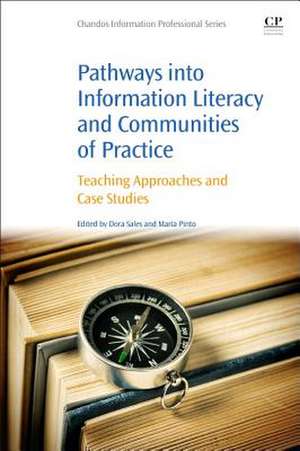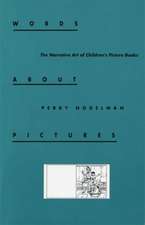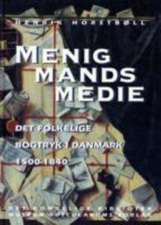Pathways into Information Literacy and Communities of Practice: Teaching Approaches and Case Studies
Editat de Dora Sales, Maria Pintoen Limba Engleză Paperback – 26 sep 2016
This edited collection presents contributions from an international perspective on this key topic in library and information science. Contributions are arranged into two sections, the first exploring teaching and learning processes, and the second presenting case studies in communities of practice, including, but not limited to, health, research environments, college students, and higher education.
- Focuses on communities of practice, including health, research, and higher education and their distinct information needs
- Includes chapters from an international and experienced set of contributors
- Presents an interdisciplinary perspective on the topic
Preț: 331.84 lei
Preț vechi: 360.70 lei
-8% Nou
Puncte Express: 498
Preț estimativ în valută:
63.49€ • 66.30$ • 52.43£
63.49€ • 66.30$ • 52.43£
Carte tipărită la comandă
Livrare economică 08-22 aprilie
Preluare comenzi: 021 569.72.76
Specificații
ISBN-13: 9780081006733
ISBN-10: 008100673X
Pagini: 294
Dimensiuni: 152 x 229 x 25 mm
Greutate: 0.5 kg
Editura: ELSEVIER SCIENCE
ISBN-10: 008100673X
Pagini: 294
Dimensiuni: 152 x 229 x 25 mm
Greutate: 0.5 kg
Editura: ELSEVIER SCIENCE
Cuprins
Part I: Perspectives on Information Literacy Teaching
Chapter 1. Information Literacy and Critical Thinking: Context and Practice
Chapter 2. Inquiry Learning: A Pedagogical and Curriculum Framework for Information Literacy
Chapter 3. Information Literacy and Flipped Learning
Chapter 4. Inclusion of Information Literacy in the Curriculum Through Learning Communities and Action Research
Chapter 5. The Scoring Rubric for Information Literacy as a Tool for Learning
Part II: On Information Literacy Programs
Chapter 6. The Relevance of Communicative Competence in the Context of Information Literacy Programs
Chapter 7. Information Culture and Information Literacy as a Scientific Direction and a Field of Educational Activities in Russia
Part III: Practicing Information Literacy: Academic and Scholar Contexts
Chapter 8. Toward a Community of Epistemological Practice: A Case Study of Adult Returners to Higher Education
Chapter 9. Information Literacy Requirements for Open Science
Chapter 1. Information Literacy and Critical Thinking: Context and Practice
Chapter 2. Inquiry Learning: A Pedagogical and Curriculum Framework for Information Literacy
Chapter 3. Information Literacy and Flipped Learning
Chapter 4. Inclusion of Information Literacy in the Curriculum Through Learning Communities and Action Research
Chapter 5. The Scoring Rubric for Information Literacy as a Tool for Learning
Part II: On Information Literacy Programs
Chapter 6. The Relevance of Communicative Competence in the Context of Information Literacy Programs
Chapter 7. Information Culture and Information Literacy as a Scientific Direction and a Field of Educational Activities in Russia
Part III: Practicing Information Literacy: Academic and Scholar Contexts
Chapter 8. Toward a Community of Epistemological Practice: A Case Study of Adult Returners to Higher Education
Chapter 9. Information Literacy Requirements for Open Science



